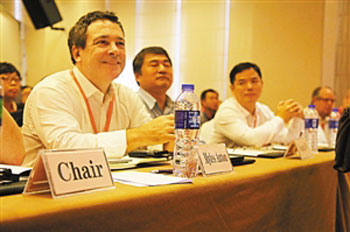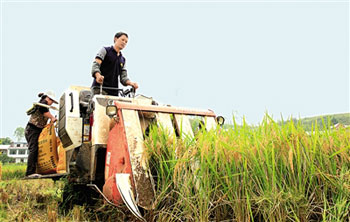Agriculture in Shenzhen has been used as an engine for zero gene seeds.
The second International Conference on Agricultural Genomics was held in Dapeng New area, where more than 300 top scientists discussed agricultural scientific and technological innovation.
Insert technological wings into agriculture and install genetic motors for seeds.

MylesAxton, president of the conference and editor-in-chief of Nature Genetics.
Li Jiayang, president of the Congress, vice minister of agriculture and president of the Chinese Academy of Agricultural Sciences.
Corn, which can be eaten raw, will be on the market soon.
The 17th High-tech Fair is in full swing in Shenzhen. at the same time, a grand gathering of more than 300 agricultural genomics experts and scholars from all over the world also kicked off in Dapeng New area.
From November 16 to 18, the second International Agricultural Genomics Conference was held in Dapeng New area, sponsored by the famous international journal Nature Genetics (NatureGenetics), Chinese Academy of Agricultural Sciences, Shenzhen Agricultural Genome Research Institute, Dapeng New area Management Committee and Shenzhen Zhongnong Jingyue Biotechnology Co., Ltd. Top academic figures from more than a dozen countries and regions, including a number of Chinese and foreign academicians, gave reports on the conference. MylesAxton, editor-in-chief of Nature-Genetics and professor of molecular and cell biology at the University of Oxford, and Li Jiayang, vice minister of agriculture, president of the Chinese Academy of Agricultural Sciences, and academician of the Chinese Academy of Agricultural Sciences, co-chaired the organizing committee. Wu Yihuan, vice mayor of Shenzhen, attended the opening ceremony and delivered a speech on behalf of the municipal government.
More than 300 scholars and experts gathered
Genomics is a booming new discipline in the field of life science, which not only plays a leading role in the research of agricultural basic biology, but also brings new opportunities for the development of biological seed industry.
In 2014, the contribution rate of China's agricultural scientific and technological progress has increased from 20% in the early days of the founding of New China to 56%. According to Qian Qian, a former researcher, director of the Shenzhen Agricultural Genome Research Institute of the Chinese Academy of Agricultural Sciences, at present, led by Chinese scientists and with international cooperation, the genomes of about 70% to 80% of important crops, such as rice, wheat, corn, and cucumbers, have been sequenced, and the functional traits of the genetic genes of these crops have been preliminarily mastered, and the research level has been in the forefront of the world.
On January 1 next year, China will formally implement the new "seed Law" aimed at improving seed quality and ensuring national food security, clearly requiring national scientific research institutes and institutions of higher learning to focus on basic and frontier applied technology research in breeding. Seed enterprises and scientific research institutes are encouraged to jointly build technology research and development platforms to provide effective scientific and technological support for the cultivation of new varieties with independent intellectual property rights.
In this context, the conference not only provided a platform for demonstrating the latest achievements of agricultural genomics, but also built a cooperative platform for agricultural genomics technology and agricultural breeding. It is reported that the theme of the conference is "insert the wings of science and technology for agriculture and install the genetic motor for seeds." more than 300 scholars and experts from more than 10 countries and regions around the world discussed six aspects, including agricultural genomics, seed resources, and breeding. At the same time, the conference also invited relevant government departments and leading seed enterprises to participate in the "industry-university-research" docking negotiations.
A New Business Card for the Development of Biological Industry in Shenzhen
Since 2011, Shenzhen's share of agriculture in GDP has been zero, but this time it has attracted the attention of the forefront of the world's agricultural science and technology. As China's national independent innovation demonstration zone and the first national innovative city, Shenzhen has listed bioindustries and life and health industries as strategic emerging industries and future industries respectively, focusing on cultivation and support. efforts will be made to build a full-factor policy support system layout.
Around this goal, Shenzhen is speeding up the gathering of high-quality technology and industrial resources, speeding up the creation of an international biological valley, and striving to build a strong city of life science and technology, a major city of life industry, and a world-class life and health industry base. At present, the scale of Shenzhen's biological industry has exceeded 100 billion yuan, and the output capacity of gene sequencing has accounted for half of the world.
Shenzhen is changing from information technology (IT) as the main driving force to "information technology (IT) + biotechnology (BT)" dual drive. In September last year, after hosting six consecutive IT leaders' summits, Shenzhen successfully held the first BT leaders' Summit, which opened the "IT+BT" double summit model and became a landmark event to promote the integrated development and innovative development of the information technology and biotechnology industries.
During the annual national and international high-tech event, the holding of the world's top agricultural genomics conference is another example of the integration and development of information technology and production technology. The Agricultural Genomics Conference will also become a new business card for the development of Shenzhen's biological industry.
In his speech, Li Jiayang praised Shenzhen for its forward-looking development vision and its support for the development of the biological industry in recent years. He said that Shenzhen, which does not have "agriculture, rural areas and farmers", is gradually having the most cutting-edge and cutting-edge scientific research achievements in biotechnology and life and health industries.
The national biological seed industry center is gradually formed.
Dapeng New area has 356 days of good air in 365 days of the year, and 76% of the land area is covered by forest. It is not only the ecological pure land of Shenzhen, but also the youngest functional new area in Shenzhen. At the beginning of its establishment, the municipal party committee and municipal government set the policy of "giving priority to protection, scientific development, fine management and raising the level" for Dapeng New area, requiring the new area to have the maximum common divisor between economic development and ecological protection.
The new area revolves around the construction of "three islands and one district" (biological island, life island, ecological island and world-class coastal eco-tourism resort) and Shenzhen International Biological Valley, seizing the opportunity for the rapid development of biological industry and life and health industry. We will promote the construction of projects such as "one bank, one institute, two parks"-- the National Gene Bank, the Shenzhen Institute of Biological breeding Innovation of the Chinese Academy of Agricultural Sciences, the Shenzhen International Biological Valley Life Science Industrial Park, and the Marine Biological Industrial Park. for the international biological valley construction reserve project and provide an important supporting platform.
Dapeng New area has become an important city of biotechnology industry layout in Shenzhen.
The hand-in-hand with bio-agriculture began when the new area was about to be completed. On November 15, 2011, the day before the 13th High-tech Fair, Shenzhen Biological breeding Innovation Research Institute of the Chinese Academy of Agricultural Sciences held an unveiling ceremony and officially settled in Dapeng New area. In 2014, the Chinese Academy of Agricultural Sciences decisively placed the second major project in the new area, the Institute of Agricultural Genomics. This is the first national unit of agricultural genomics and the only national public welfare research institute specializing in the basic and applied research of agricultural genomics in the world.
- Prev

A 5-year reprieve for the death penalty of a highly toxic pesticide must be refunded.
A 5-year reprieve for the death penalty of a highly toxic pesticide must be refunded.
- Next

Under the "rice guest" of Henan Province, Guangxi traveled 60,000 miles in half a year.
Under the "rice guest" of Henan Province, Guangxi traveled 60,000 miles in half a year.
Related
- A course of planting techniques and methods on how to grow carrots
- How to plant the latest tulips?
- Is it better to pick tea in the morning or in the afternoon? When is the best time for tea to be picked? what is the third or fifth tea?
- Launch Yuanxiao Happy combination Haocha + Tea Yuan healthy Taste
- Penghu Tourism "Fireworks 20 Parade with You"
- 2022 West Lake Happiness holds "Digital Revitalization Voucher" and draws iphone13 and laptop.
- Banqiao Fuzhou social houses are designed to change start-up combined with police elimination to create a safe and livable environment
- The convenient measure of "mechanical weeding" in Xinbei has been abused and the Agriculture Bureau has imposed heavy penalties on the illegal land consolidation.
- Changgeng University Joins Hands with Four Memory Factories to Rescue Memory Talent Shortage
- The list of Taiwan's top 100 MVP managers is listed by the Director-General of the Farmers' Association of Sanxia District.

